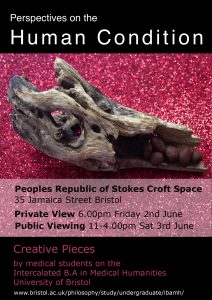
An Exhibition of Creative Pieces by students on the Intercalated BA in Medical Humanities at the University of Bristol
11 am to 4 pm
Each year the University of Bristol offers medical students the opportunity to pause their studies and gain an intercalated BA in medical humanities. Joining English and Philosophy students, these medical students are able to explore some of the wider issues around healthcare with a particular emphasis placed on an arts based inquiry into such topics.
This exhibition comes as the culmination of these students’ study and is built around a range of creative pieces from the students which highlight the role of the arts in extending perceptions around ‘what it is to be human’. These works are supplemented by reports from students’ experiences learning about the role that music, art and theatre may play in therapy and also how the arts contribute to well-being within the medical community.
The exhibition also includes reflections on some of the events organised as part of the students’ learning, such as the history of medicine course at the Worshipful Society of Apothecaries, visits to the Wellcome Trust, London, and the Jenner Museum, Berkeley, a seminar with The Drive Project, and the annual Medicine Unboxed conference.
